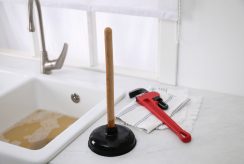There are several sealing options available for travertine, and one that is becoming more popular due to the low cost and high quality of these tiles is the use of sealers. Sealers can be used on the tiles to help them stay in good condition for years to come.
If you have an existing slab and are looking for a way to protect it from moisture, cracking, or any other damage, then sealing maybe your best option. When choosing a tile for your flooring, you will want to make sure it is sealed properly. For maximum travertine protection, please view this write-up on graniteprotect.
There are many different options when it comes to sealing your travertine. The first step is to learn about the different sealing options available so you can make the best choice for your home. You will also want to learn about the different products and services that are available so you can choose the right products for your situation.
Here are a few of the common sealing options for travertine tiles. Water-based sealers are the most common, but there are some special liquids that may work better on your tile. A penetrating solvent is one option you may want to try.

This type of sealer penetrates deep into the pores of the stone, protecting it from drying out and cracking. This type of treatment will take several applications over time, depending on the thickness of the tile. Sealers that contain bicarbonate are good choices for preventing the buildup of mold.
Baking soda and muriatic acid are also good products to consider if you are concerned about mold build-up. Oil-based sealers are another common choice for homeowners. These products help seal the surface to prevent moisture from seeping into the pores of the tile.
Be careful with these, however, as they have the potential to damage your tiles. Applying too much oil-based product can eventually lead to thinning of the countertop. Using silicone-based sealants instead is recommended for maintenance purposes only.
Another great option for sealing your travertine countertops is to use a water-based product. These types of products will help draw out any water that may be in the pores of the stone, effectively sealing them in place. This is best used in areas where water tends to be a problem, such as around sinks, tubs, and showers.
It can also be used to help seal out moisture in your patio if you happen to have a leak there. Travertine tile is naturally sealed by minerals. However, over time, it can start to weaken. A good sealing product will neutralize the effects of these naturally occurring minerals, thereby improving the strength of your countertop.
Applying a sealer that contains silica is one way to help strengthen the overall strength of your countertop. If your kitchen or bathroom needs a major revamp, consider sealing your travertine surfaces. You’ll find that these types of surfaces are incredibly easy to coat with epoxy paint that will help give your countertops a whole new look.
This is one of the easiest options for improving the appearance of your countertops. There are a few steps to this job, though. Before you begin, make sure that your countertops are clean and all acidic substances are removed, including acid from fruits and juices, wine and vinegar, and even some acidic foods such as bread and potatoes.
Sealing your travertine countertops will help them maintain their value and prolong their life. The better they are sealed, the less likely they will eventually need to be replaced. This is especially important if you’re looking to sell your home, as most buyers prefer a home that retains its appeal for years to come.
For this reason, sealing your countertops is probably a step that you should take before placing your home on the market. It will certainly help to increase the resale value of your home when it comes time to sell.





